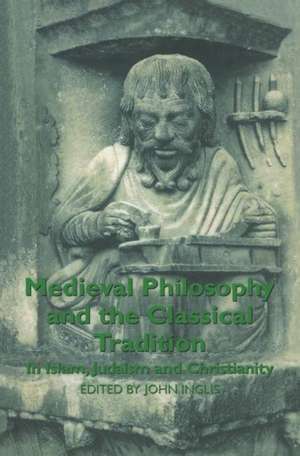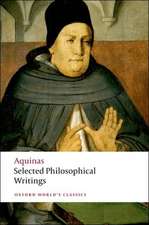Medieval Philosophy and the Classical Tradition: In Islam, Judaism and Christianity
Autor John Inglisen Limba Engleză Paperback – 25 apr 2013
| Toate formatele și edițiile | Preț | Express |
|---|---|---|
| Paperback (1) | 417.20 lei 6-8 săpt. | |
| Taylor & Francis – 25 apr 2013 | 417.20 lei 6-8 săpt. | |
| Hardback (1) | 1115.51 lei 6-8 săpt. | |
| Taylor & Francis – 14 feb 2002 | 1115.51 lei 6-8 săpt. |
Preț: 417.20 lei
Nou
Puncte Express: 626
Preț estimativ în valută:
79.83€ • 83.56$ • 66.44£
79.83€ • 83.56$ • 66.44£
Carte tipărită la comandă
Livrare economică 31 martie-14 aprilie
Preluare comenzi: 021 569.72.76
Specificații
ISBN-13: 9780415849500
ISBN-10: 0415849500
Pagini: 328
Dimensiuni: 156 x 234 x 20 mm
Greutate: 0.48 kg
Ediția:1
Editura: Taylor & Francis
Colecția Routledge
Locul publicării:Oxford, United Kingdom
ISBN-10: 0415849500
Pagini: 328
Dimensiuni: 156 x 234 x 20 mm
Greutate: 0.48 kg
Ediția:1
Editura: Taylor & Francis
Colecția Routledge
Locul publicării:Oxford, United Kingdom
Public țintă
Postgraduate and UndergraduateNotă biografică
John Inglis is Associate Professor of Philosophy at the University of Dayton.
Cuprins
Notes on Contributors Acknowledgements Introduction: Towards a Balanced Historiography of Medieval Philosophy John Inglis Section One: Historical Context 1. Medieval Islamic Philosophy and the Classical Tradition Micheal E. Marmura Section Two: Philosophy 2. A Philosophical Odyssey: Ghazzali's Intentions of the Philosophers Gabriel Said Reynolds 3. The Relationship between Averroes and al-Ghazali: as it presents itself in Averroes' Early Writings, especially in his Commentary on al-Ghazali's al-Mustasfa Frank Griffel 4. Al-Ghazali and Halevi on Philosophy and the Philosophers Barry S. Kogan Section Three: Neoplatonism 5. Projection and Time in Proclus D. Gregory MacIsaac 6. Forms of Knowledge in the Arabic Plotinus Peter Adamson 7. Secundum rei vim vel secundum cognoscentium facultatem : Knower and Known in the Consolation of Philsosophy pf Boethius and the proslogion of Anselm Wayne J. Hankey 8. Proclean 'Remaining' and Avicenna on Existence as Accident: Neoplatonic Methodology and a Defense of 'Pre-Existing' Essences Sarah Pessin 9. Augustine vs Plotinus: The Uniqueness of the Vision at Ostia Thomas Williams Section Four: Creation 10. Infinite Power and Plenitude: Two Traditions on the Necessity of the Eternal Taneli Kukkonen 11. The Challenge to Medieval Christian Philosophy: Relating Creator to Creatures David B. Burrell, C.S.C. Section Five: Virtue 12. Three Kinds of Objectivity Jonathan Jacobs 13. On Defining Maimonides' Aristotelianism Daniel H. Frank 14. Porphyry, Bonaventure and Thomas Aquinas: A Neoplatonic Hierarchy of Virtues and Two Christian Appropriations Joshua P. Hochschild Section Six: The Latin Reception 15. William of Auvergne and the Aristotelians: The Nature of a Servant Michael Miller 16. Is God a 'What'? Avicenna, William of Auvergne, and Aquinas on the Divine Essence John P. Rosheger 17. Maimonides and Roger Bacon: Did Roger Bacon Read Maimonides? Jeremiah Hackett Index
Descriere
This book focuses on the Islamic, Jewish, and Christian use of - and reaction to - Classical philosophy during the Middle Ages.

















